Have you ever encountered that mid-afternoon slump, where your energy levels dramatically decline? The key to sustaining consistent energy might reside in the selection of your dietary choices, particularly those high in carbohydrates. This article delves into the most beneficial carbohydrate-rich foods, which can energize your body and bolster your overall health.
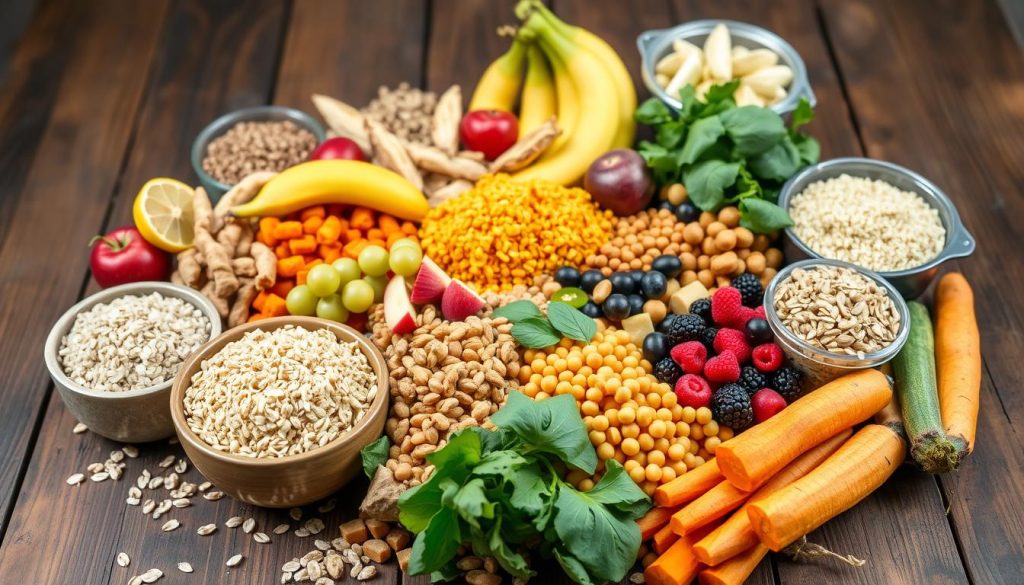
During my initial marathon training, I discovered the critical role of proper fueling in my performance. I would often hit a wall, feeling utterly exhausted, until I discovered the efficacy of complex carbohydrates. Consuming whole grains, fruits, and vegetables provided the necessary, sustained energy to overcome those arduous training sessions. I am now eager to impart this knowledge to you, so you can experience the same enhancement in performance and well-being.
Key Takeaways:
- Carbohydrate-rich foods are essential for providing sustainable energy and supporting overall health.
- Whole grains, fruits, and starchy vegetables are some of the best sources of complex carbohydrates.
- Incorporating a variety of carbohydrate-rich foods into your diet can help maintain steady energy levels and optimize physical and mental performance.
- Understanding the differences between simple and complex carbohydrates is key to making informed food choices.
- Timing your carbohydrate intake around exercise and daily activities can help maximize their benefits.
Understanding the Role of Carbohydrates in Your Body
Carbohydrates serve as the primary energy source for our bodies, crucial for daily activities and cognitive functions. Grasping the distinctions between simple carbohydrates and complex carbohydrates, alongside the intricacies of carbohydrate metabolism, empowers us to make choices that enhance health and performance.
Simple vs Complex Carbohydrates
Simple carbohydrates, or simple sugars, are swiftly digested and absorbed, offering immediate energy. Fruits, honey, and table sugar exemplify this category. Conversely, complex carbohydrates, encompassing whole grains, beans, and starchy vegetables, are digested more slowly, delivering sustained energy.
How Carbs Fuel Your Energy Systems
Upon ingestion, carbohydrates are transformed into glucose, the primary fuel for cellular functions. This glucose is then converted into adenosine triphosphate (ATP), the body’s energy currency. The speed of this conversion varies with the type of carbohydrate, with complex carbohydrates offering a more prolonged energy supply.
The Science Behind Carbohydrate Metabolism
The carbohydrate metabolism process is a complex series of physiological mechanisms. Digestive enzymes decompose carbohydrates into glucose, which is transported via the bloodstream to cells across the body. These cells then convert the glucose, in conjunction with oxygen, into ATP, the molecule that energizes cellular activities.
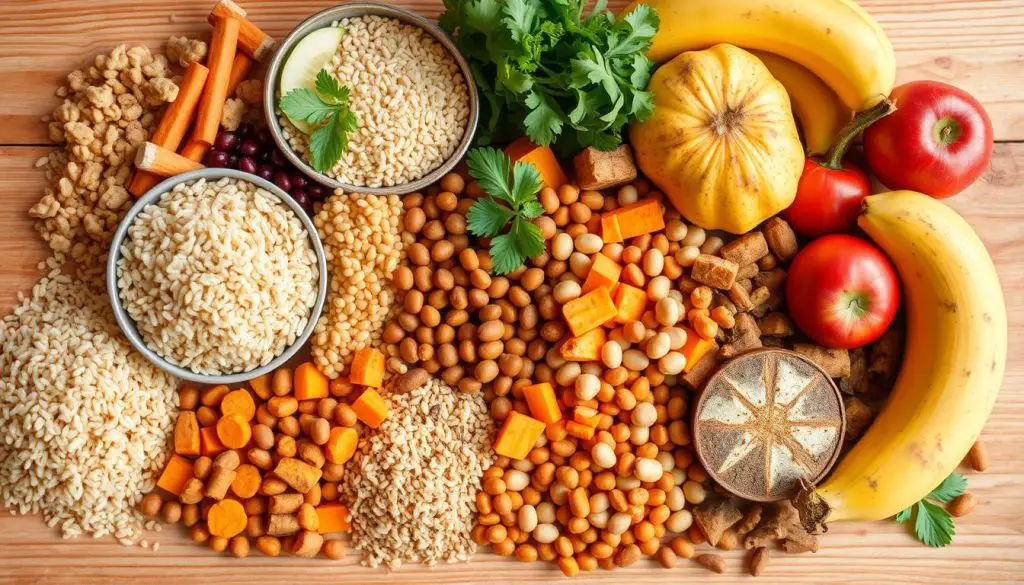
“Understanding the role of carbohydrates in your body is the first step to making informed decisions about your overall nutrition and energy needs.”
Whole Grains: The Foundation of Sustained Energy
Whole grain carbohydrate foods are essential for maintaining long-lasting energy. These complex carbohydrates are rich in vital nutrients and slowly release energy. This provides a steady flow of power throughout the day.
Whole grains, such as brown rice, quinoa, oats, and whole wheat, are prime sources of complex carbohydrates. Unlike refined grains, they retain their nutrient-rich bran and germ. This ensures your body receives a wealth of essential vitamins, minerals, and fiber.
Incorporating whole grain carbohydrate foods into your diet offers numerous benefits. They help stabilize blood sugar levels, promote feelings of fullness, and support digestive health. Moreover, the complex carbohydrates in whole grains fuel your body’s energy systems. This allows you to tackle daily tasks with vigor and endurance.
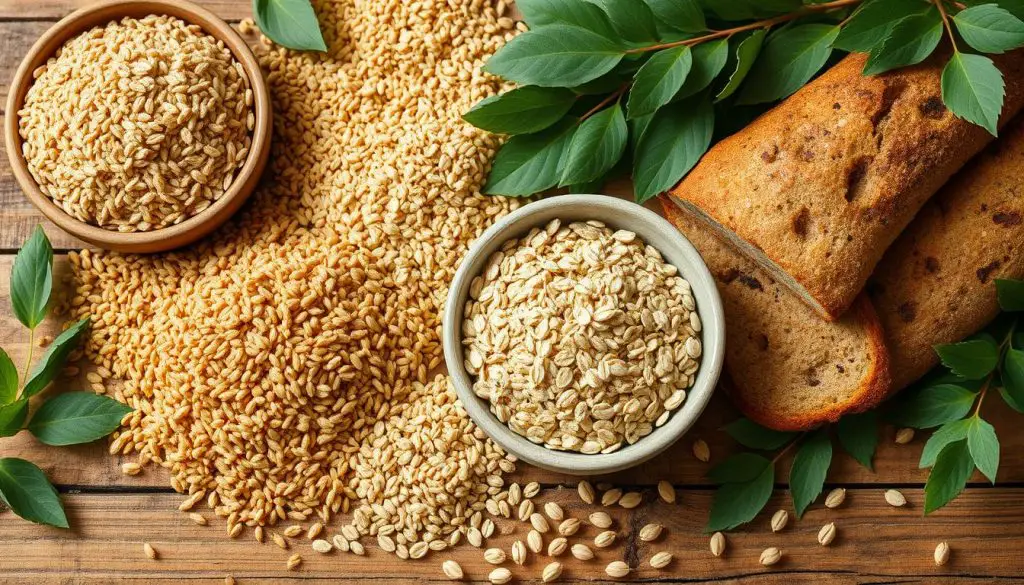
Explore the vast array of whole grain options available. Make them the cornerstone of your meals and snacks. From hearty oatmeal breakfast bowls to nutty quinoa salads, these slow-releasing carbohydrates power your body and mind. They ensure you have the energy and vitality to thrive throughout the day.
Top Carbohydrate-Rich Foods for Daily Nutrition
Carbohydrates serve as the primary energy source for our bodies, making them indispensable in our daily intake. They are essential for maintaining optimal health and performance. Whether it’s a nutritious breakfast or a fulfilling lunch, various carbohydrate-rich foods offer the necessary sustenance.
Breakfast Options
Begin your day with high-carb breakfast foods like whole-grain oats, quinoa, or whole-wheat toast, accompanied by fresh fruit such as bananas or berries. Oatmeal stands out, boasting complex carbs and fiber to enhance satiety and energy. For a savory option, eggs scrambled with spinach or tomatoes are a nutrient-dense choice.
Lunch and Dinner Choices
Whole grains like brown rice, quinoa, or bulgur are ideal bases for lunch and dinner. Combine them with roasted root vegetables, such as sweet potatoes or butternut squash, for a nutrient-dense meal. Legumes, including lentils or chickpeas, are also rich in complex carbohydrates, suitable for soups, stews, or salads.
Healthy Snack Alternatives
For snacks that sustain energy, opt for whole-grain crackers with hummus, apple slices with nut butter, or unsweetened dried fruit. These snacks offer a balanced mix of complex carbs, fiber, and essential nutrients, fueling your body between meals.
Incorporating these best carbohydrate foods for health into your daily routine ensures a steady energy supply and the necessary nutrients for optimal body function.
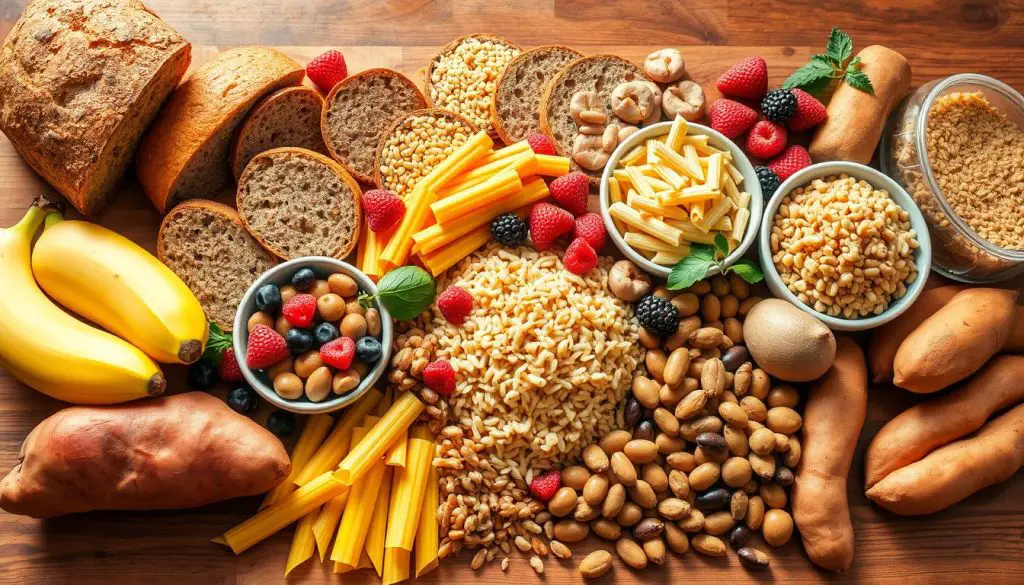
“Carbohydrates are the foundation of a healthy, balanced diet. Prioritizing high-carb breakfast foods, carbohydrate-rich snacks, and carb-rich meals can help you maintain consistent energy levels and support overall well-being.”
Fruits: Nature’s Sweet Energy Boosters
Fruits emerge as a paramount source of natural energy, embodying nature’s bounty. These carb-rich fruits are not only delectably sweet but also replete with vital nutrients. They serve as a cornerstone in a well-rounded diet.
Edibles such as bananas, oranges, and apples are quintessential foods with fast-digesting carbs. They swiftly replenish energy reserves. These high-carb foods for health contribute to cardiovascular wellness and muscle recuperation.
For those in pursuit of a pre-workout snack or a midday revitalizer, integrating the following carb-rich fruits into your regimen is advisable:
- Bananas – Rich in potassium, they serve as natural energy bars, ideal for an active lifestyle.
- Citrus fruits (oranges, grapefruits, tangerines) – Abundant in vitamin C and easy-to-digest carbs.
- Berries (blueberries, raspberries, strawberries) – Packed with antioxidants and low in calories, they are a guilt-free indulgence.
- Mangoes – A tropical delight with a natural sweetness and quick-acting carbs.
“Fruits are nature’s candy, providing a delicious way to power your body and mind.”
Integrate these vibrant carb-rich fruits into your diet to tap into their energy-boosting properties. Enjoy the natural sweetness and benefits of whole-food carbohydrates.

Starchy Vegetables for Sustained Performance
Starchy vegetables are pivotal for sustaining energy and achieving peak performance. They are a treasure trove of complex carbohydrates, essential for powering through workouts and daily tasks. Root vegetables, winter squashes, corn, and peas are prime examples of carbohydrate-rich foods that bolster health and energy.
Root Vegetables
Root vegetables, including potatoes, sweet potatoes, carrots, and beets, are rich in complex carbohydrates. These provide sustained energy. Additionally, they are a treasure trove of fiber, vitamins, and minerals, making them a nutritious staple. Whether roasted, mashed, or added to soups and stews, they offer a versatile and satisfying energy source.
Winter Squashes
Winter squashes, such as butternut and acorn, are a seasonal delight. They are a rich source of carbohydrates, offering a slow-burning energy source. This makes them ideal for sustaining performance throughout the day. Enjoy them roasted, pureed, or in hearty stews to enhance your carbohydrate-rich diet.
Corn and Peas
Corn and peas are often underappreciated but are indeed carbohydrate-rich vegetables. Corn is a complex carbohydrate source, rich in fiber and B vitamins. Peas, on the other hand, offer a unique combination of protein and carbohydrates. These can be savored as side dishes, in salads, or blended into soups and dips for a nutrient-dense boost.

Integrating a variety of starchy vegetables into your diet is crucial for maintaining steady energy levels and supporting overall health. It optimizes performance, whether you’re an athlete or simply seeking an active, balanced lifestyle.
Legumes: Protein-Packed Carbohydrate Sources
Legumes stand out as a unique blend of carbohydrates and protein, making them a nutritional powerhouse. They offer sustained energy and support muscle growth, enhancing overall health. For those following a vegan, vegetarian diet, or simply looking to increase plant-based foods, legumes are essential.
Legumes, including lentils, chickpeas, black beans, and edamame, are packed with complex carbohydrates. These provide long-lasting energy. They also contain high amounts of fiber, crucial for digestive health and satiety. Legumes are particularly beneficial for muscle building, combining carbs and protein effectively.
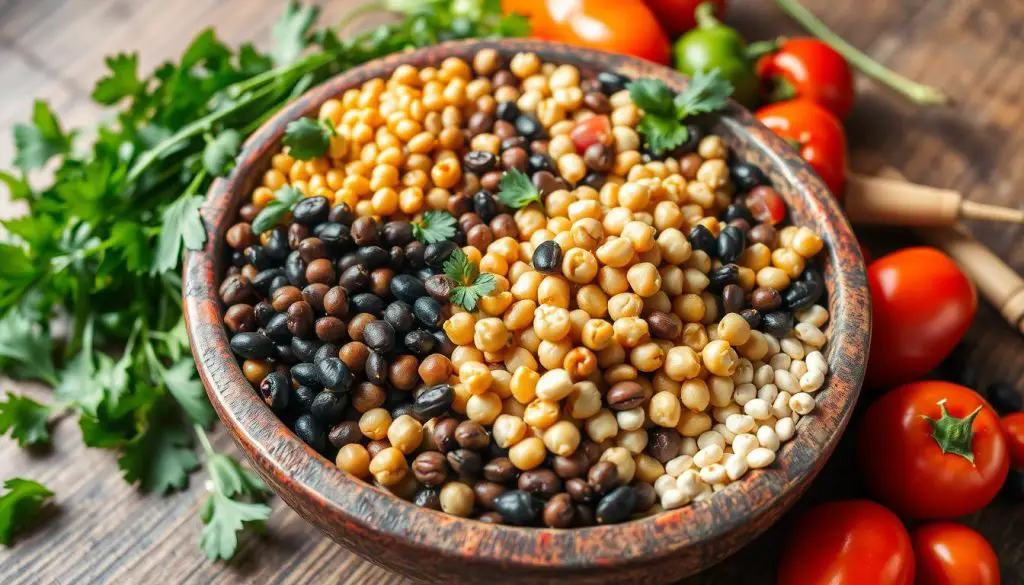
Adding legumes to your diet boosts vegan carbohydrate foods intake and overall health. They are versatile, fitting into salads, soups, stews, and baked goods. Legumes are ideal for fueling workouts, maintaining energy, or enjoying a nutritious meal. They are a key component of a balanced diet.
“Legumes are a true nutritional powerhouse, providing a winning combination of complex carbohydrates, protein, and fiber. They are a game-changer for anyone seeking long-lasting energy and muscle support.” – Nutrition Expert, Jane Doe
Strategic Timing of Carbohydrate Intake
The timing of carbohydrate intake is as vital as the types of carbs for athletes. Aligning your carb consumption with your training and recovery needs optimizes their benefits. This supports your body’s peak performance.
Pre-Workout Nutrition
In the 30-60 minutes before your workout, focus on fast-acting carbs for athletes. Opt for fresh fruit, sports drinks, or simple carbohydrate supplements. These best carbs for workout energy fuel your muscles for optimal performance.
Post-Exercise Recovery
After your workout, your muscles are ready to replenish glycogen stores. This is the ideal time for foods for muscle energy like whole grains, starchy vegetables, and legumes. They restore energy and aid in muscle repair and growth.
Daily Energy Management
- Spread your carbohydrate intake evenly throughout the day to maintain consistent energy levels.
- Include a variety of carbs for athletes, such as whole grains, fruits, and vegetables, at each meal and snack.
- Stay hydrated and pair your carbohydrates with protein and healthy fats for a balanced, sustainable energy source.
Strategic timing of carbohydrate intake fuels your athletic performance, supports recovery, and maintains energy levels throughout the day.
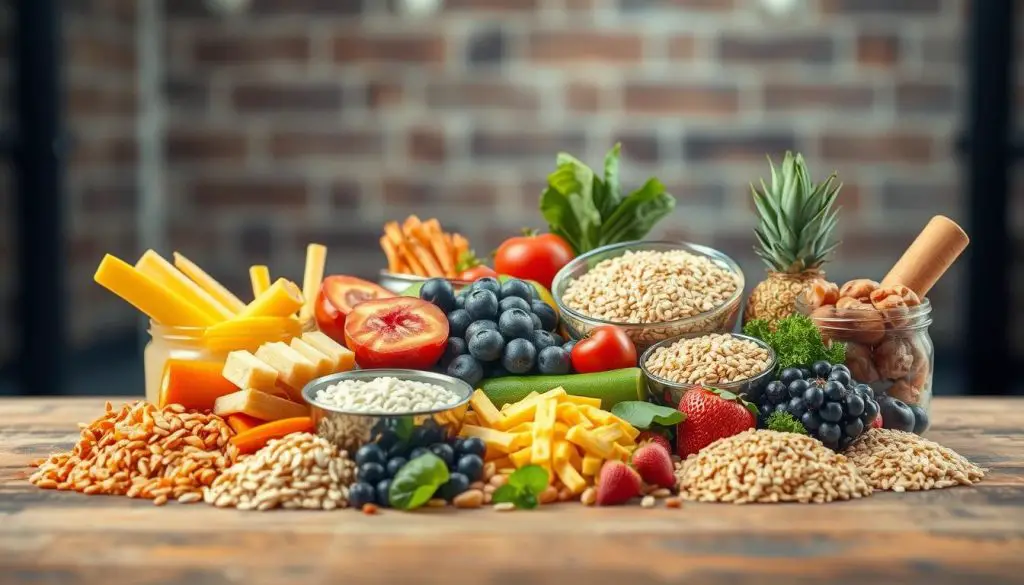
Benefits of High-Fiber Carbohydrate Foods
Carbohydrates transcend mere energy provision, offering a plethora of health benefits, particularly from high-fiber sources. These fiber-rich carbs are pivotal in supporting digestive health, enhancing heart wellness, and fostering overall well-being. Exploring the advantages of integrating high-fiber carbohydrates into one’s diet is enlightening.
Fiber for Digestive Health
Fiber is indispensable for a healthy digestive system. High-fiber carbs, such as whole grains, beans, lentils, and fruits, facilitate regular bowel movements, alleviate constipation, and foster the growth of beneficial gut bacteria. These bacteria are vital for immune function and nutrient absorption. A diverse intake of high-fiber carbohydrates ensures a harmonious digestive system.
Fiber for Heart Health
Research indicates that high-fiber carbs are beneficial for cardiovascular health. They aid in cholesterol reduction, diminish heart disease risk, and stabilize blood sugar levels. Oats, barley, and certain vegetables are prime sources of soluble fiber. This type of fiber is instrumental in lowering “bad” LDL cholesterol and elevating “good” HDL cholesterol.
Fiber for Overall Well-Being
Beyond digestive and heart health, high-fiber carbs contribute to overall well-being. They induce feelings of fullness and satiety, aiding in appetite regulation and weight maintenance. Moreover, the vitamins, minerals, and antioxidants in high-fiber carb sources bolster immune function, bone health, and even brain health.
“Incorporating more high-fiber carbs into your diet is one of the simplest and most effective ways to boost your overall health and well-being.”
From whole grains and starchy vegetables to legumes and fruits, a myriad of delicious and nutritious high-fiber carb options exist. By integrating these fiber-rich carbohydrates into your diet, you can reap their benefits for your digestive system, heart, and overall health.
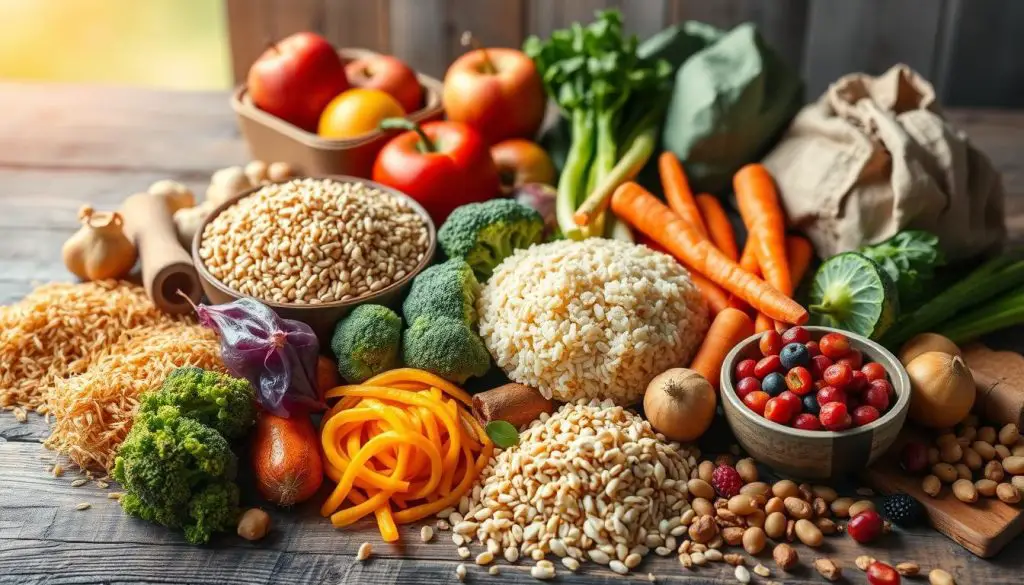
Smart Carbohydrate Choices for Athletes
As an athlete, whether you’re training for endurance events or focused on strength building, your body’s need for carbs for endurance and high-carb foods for performance is crucial. Incorporating the right carb-rich options for athletes can significantly boost your energy levels, recovery, and overall athletic performance.
Endurance Training
For endurance athletes, complex carbohydrates like whole grains, oats, and brown rice should be the foundation of your diet. These carbs for endurance provide a sustained release of energy to fuel your long-lasting workouts. Consider adding nutrient-dense options like quinoa, sweet potatoes, and wild rice to your pre-workout meals.
Strength Training
Power and strength athletes require a different approach. High-carb foods for performance like bananas, dates, and ripe mangoes can provide the quick-acting energy needed for intense, short-duration training. Pair these carb-rich options for athletes with lean proteins to optimize muscle recovery and growth.
Recovery Nutrition
Replenishing carbohydrates after a tough workout is crucial for restoring glycogen stores and supporting muscle repair. Opt for easily digestible carb-rich options for athletes like white rice, baked potatoes, and fruit smoothies to kickstart your post-exercise recovery.
By tailoring your carbohydrate intake to the specific demands of your sport, you can unlock the true potential of these macronutrients and take your athletic performance to new heights.
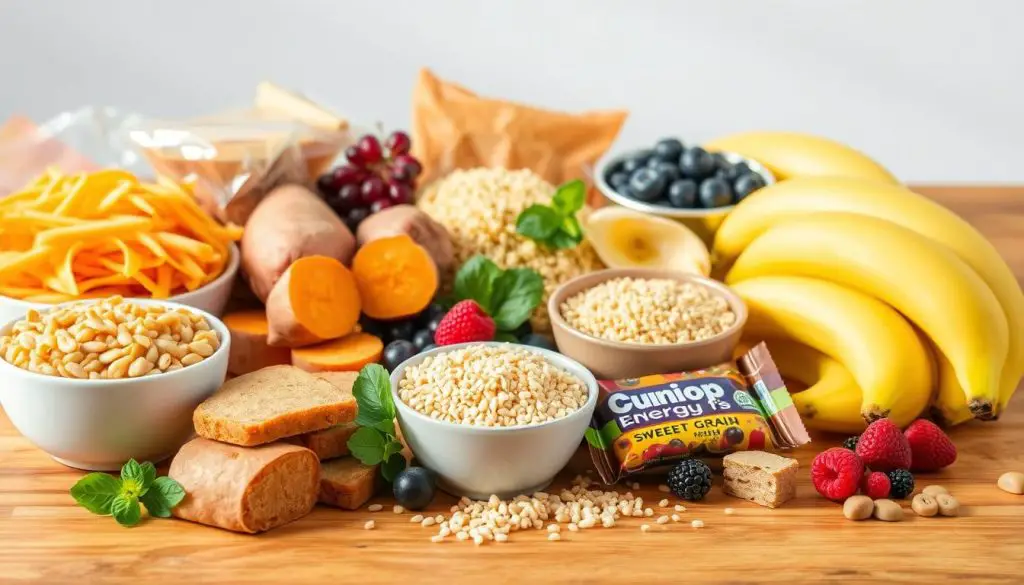
Understanding Glycemic Index in Food Choices
The glycemic index (GI) plays a pivotal role in our dietary selections, impacting both energy maintenance and overall health. It quantifies the rate at which carbohydrate-rich foods elevate our blood sugar levels. This metric is essential for those aiming to sustain energy and foster long-term health.
Carbohydrates with a low glycemic index are digested and absorbed at a slower pace, ensuring a consistent energy release. These low glycemic carbs are pivotal for sustaining health, as they aid in blood sugar regulation and diminish the risk of chronic diseases, notably type 2 diabetes. Whole grains, legumes, and a variety of fruits and vegetables exemplify low GI foods.
In contrast, high glycemic carbs are swiftly metabolized, causing a swift increase in blood sugar followed by a precipitous energy decline. Although these high glycemic index foods offer immediate energy boosts, such as pre-workout, their consumption should be judicious to prevent blood sugar imbalances and potential health complications.
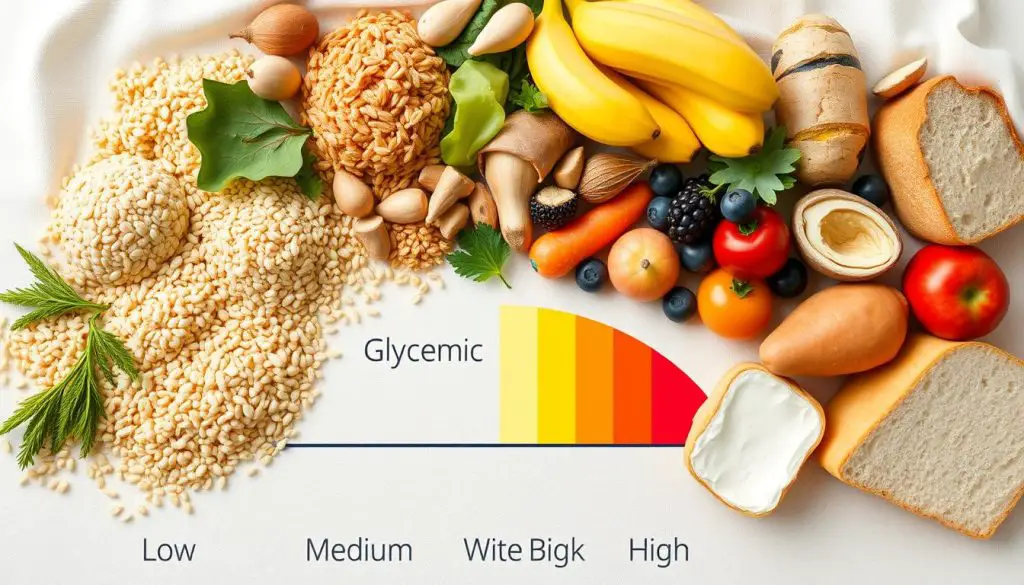
Grasping the glycemic index of consumed foods empowers individuals to make choices that bolster their overall wellbeing. By integrating a mix of low and high glycemic index carbohydrates into one’s diet, one can optimize energy levels, enhance metabolic health, and provide the body with the necessary nutrients.
Plant-Based Sources of Quality Carbohydrates
In the quest for peak energy and health, plant-based carbohydrates present a myriad of advantages. Whether adhering to a vegan regimen or merely desiring gluten-free alternatives, the realm of nutrient-dense carbohydrate foods derived from plants is both extensive and adaptable.
Whole grains, such as quinoa, brown rice, and whole wheat, stand as premier examples of complex carbohydrates, delivering enduring vitality. These gluten-free carbohydrate-rich foods are further distinguished by their high fiber, vitamin, and mineral content, rendering them a wholesome option for any dietary inclination.
Legumes, encompassing beans, lentils, and chickpeas, represent vegan carbohydrate foods that unite complex carbs, protein, and fiber in a formidable synergy. They can be effortlessly integrated into a multitude of dishes, ranging from robust soups to aromatic curries.
Starchy vegetables, including sweet potatoes, butternut squash, and corn, serve as nutrient-dense carbohydrate foods that impart a natural energy surge. These plant-based entities not only tantalize the palate but also abound with vital vitamins, minerals, and antioxidants.
“Embracing plant-based carbohydrates opens up a world of culinary possibilities and nutritional benefits.”
Fruits, such as bananas, berries, and citrus, embody nature’s vegan carbohydrate foods, providing a natural and gratifying energy boost. These nutrient-dense carbohydrate foods are also replete with fiber, vitamins, and antioxidants, positioning them as a flexible and salubrious selection.
By delving into the varied spectrum of plant-based carbohydrate sources, one can forge a diet that is both balanced and nourishing, energizing the body while aligning with individual dietary preferences and requirements.
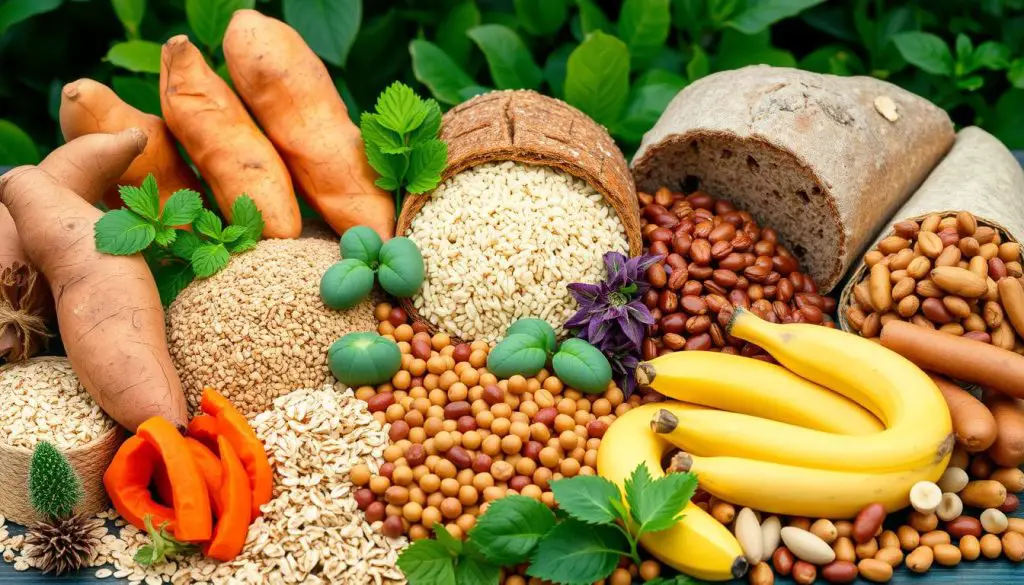
Balancing Carbohydrates with Other Nutrients
Attaining a healthy diet necessitates more than just focusing on carbohydrates; it demands a harmonious blend with other vital nutrients. By merging balanced carbohydrate foods with protein, healthy fats, and a spectrum of micronutrients, one can craft meals that offer sustained energy and bolster overall health and carbs for weight management.
Protein Combinations
Combining carbs for weight management with lean proteins forms a potent synergy. The protein acts as a brake on carbohydrate absorption, facilitating a more gradual energy release and enhancing satiety. Optimal protein sources to pair with carbohydrates include grilled chicken, lentils, eggs, and Greek yogurt.
Healthy Fats Integration
Integrating foods for better stamina with healthy fats, such as avocado, nuts, seeds, and olive oil, enriches the nutritional value of your meals. These fats not only contribute to sustained energy but also bolster brain function, heart health, and hormonal balance.
Micronutrient Considerations
Completing your balanced carbohydrate foods with a variety of micronutrients, including vitamins, minerals, and antioxidants, optimizes bodily performance. Include nutrient-dense fruits, vegetables, and whole grains to ensure a broad spectrum of essential vitamins and minerals, supporting comprehensive health and well-being.
By prioritizing the creation of well-rounded meals that integrate carbs for weight management with other critical nutrients, one can reap the rewards of sustained energy, enhanced stamina, and overall health and fitness. A diverse, nutrient-rich diet is the cornerstone for unlocking your body’s maximum potential.
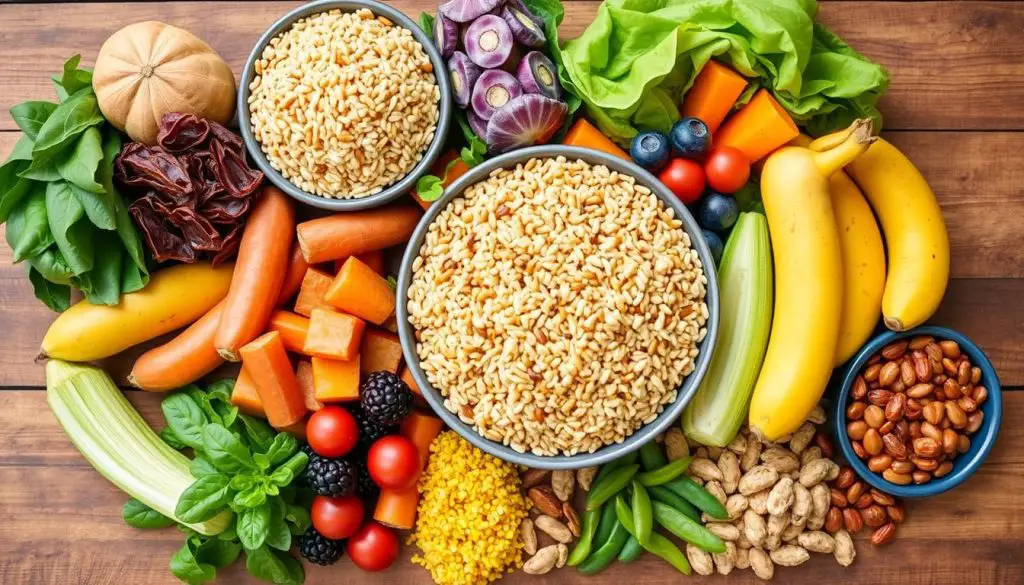
Common Myths About Carbohydrates Debunked
Carbohydrates have long been a subject of controversy, with numerous misconceptions about their role in weight loss, brain function, and overall health. However, the truth reveals that carbs are a vital macronutrient, essential for the body’s energy needs. Let’s explore and debunk some of the most prevalent myths surrounding carbohydrates.
One widespread myth posits that carbs are the primary adversaries in weight loss endeavors. In reality, carbs for weight loss can be a viable strategy when consumed in moderation and as part of a well-balanced diet. Complex carbohydrates, such as whole grains and vegetables, can aid in weight management by offering sustained energy and enhancing feelings of satiety.
Another prevalent misconception suggests that carbs are harmful to brain function. Conversely, carbs for brain function are indispensable, as the brain heavily relies on glucose for its energy. Consuming whole, healthy carb sources like fruits, vegetables, and whole grains can bolster cognitive performance and maintain mental acuity.
By grasping the facts and dispelling these common myths, you can make more informed choices regarding your carbohydrate intake. This knowledge will allow you to reap the numerous benefits these essential nutrients provide.
FAQ
What are the best carbohydrate-rich foods for energy and health?
Optimal carbohydrate sources include whole grains, fruits, starchy vegetables, legumes, and certain dairy products. These foods, rich in complex carbohydrates, are slowly digested. They offer sustained energy and numerous health benefits.
What is the difference between simple and complex carbohydrates?
Simple carbohydrates, or “simple sugars,” are quickly absorbed, providing rapid energy. In contrast, complex carbohydrates, found in whole grains, are digested more slowly. They offer sustained energy and are generally considered healthier due to their higher fiber and nutrient content.
How do carbohydrates fuel your energy systems?
Carbohydrates serve as the body’s primary fuel source. They are broken down into glucose, which cells use to produce ATP, the body’s energy currency. This process powers muscles, the brain, and other vital organs, essential for daily activities and exercise.
What are the benefits of incorporating whole grains into your diet?
Whole grains are a rich source of complex carbohydrates, providing sustained energy and health benefits. They are packed with fiber, vitamins, minerals, and antioxidants. These nutrients support digestive health, reduce chronic disease risk, and promote overall well-being. Examples include quinoa, brown rice, oats, and whole wheat.
What are some of the top carbohydrate-rich foods for breakfast, lunch, dinner, and snacks?
For breakfast, consider oatmeal, whole grain cereals, or whole grain toast with nut butter. Brown rice, quinoa, and whole wheat pasta are good for lunch and dinner. Starchy vegetables like sweet potatoes and winter squash are also beneficial. Healthy snacks include fruits, yogurt, whole grain crackers, and legume-based dips or hummus.
How do fruits provide a natural energy boost?
Fruits are a natural source of fast-digesting carbohydrates, offering a quick energy boost. They contain simple sugars like fructose and glucose, which are rapidly absorbed and used for energy. Examples include bananas, oranges, berries, and apples.
What are the benefits of incorporating starchy vegetables into your diet?
Starchy vegetables, such as root vegetables, winter squashes, corn, and peas, are rich in complex carbohydrates. They provide sustained energy and are packed with fiber, vitamins, and minerals. These nutrients make them a valuable addition to a balanced diet for overall health and performance.
How do legumes contribute to carbohydrate and protein intake?
Legumes, such as beans, lentils, and peas, offer a unique combination of complex carbohydrates and protein. They are an excellent choice for those seeking nutritious, plant-based sources of macronutrients. Legumes support muscle growth and recovery, as well as provide long-lasting energy.
When is the best time to consume carbohydrates for different fitness goals?
The timing of carbohydrate intake varies based on fitness goals. Quick-digesting carbohydrates are best before workouts for a rapid energy boost. Post-exercise, complex carbohydrates help replenish glycogen stores and support recovery. Throughout the day, a balanced approach to carbohydrate intake helps manage energy levels and supports overall performance.
What are the benefits of consuming high-fiber carbohydrate foods?
High-fiber carbohydrate foods, such as whole grains, fruits, vegetables, and legumes, offer numerous health benefits. They support digestive health, promote feelings of fullness, and can lower the risk of heart disease and type 2 diabetes. Incorporating a variety of fiber-rich carbohydrate sources into your diet contributes to overall well-being.
How should athletes approach carbohydrate intake for different training modalities?
Athletes have specific carbohydrate needs based on their training and competition demands. Endurance athletes may require higher carbohydrate intake to fuel workouts and support recovery. Strength-focused athletes benefit from a balanced approach that includes protein and healthy fats. Tailoring carbohydrate intake to individual goals and training routines optimizes performance and recovery.
What is the importance of the glycemic index in carbohydrate choices?
The glycemic index measures how quickly a carbohydrate-containing food raises blood sugar levels. Foods with a low glycemic index, like whole grains and most fruits and vegetables, are digested and absorbed more slowly. They provide a steadier energy release. High glycemic index foods, such as refined carbs and sugary treats, can cause rapid spikes and crashes in blood sugar. Understanding the glycemic index guides healthier carbohydrate choices.
What are some plant-based sources of quality carbohydrates?
Excellent plant-based sources of carbohydrates include whole grains (such as quinoa, brown rice, and whole wheat), starchy vegetables (like sweet potatoes and winter squash), legumes, and a variety of fruits and vegetables. These nutrient-dense carbohydrate options are beneficial for those following vegan or gluten-free diets, as well as anyone seeking wholesome, plant-based sources.
How can you balance carbohydrates with other essential nutrients?
To create a well-rounded diet, pair carbohydrates with adequate protein, healthy fats, and essential micronutrients. For example, combining whole grains with lean proteins, such as chicken or fish, balances macronutrients. Incorporating healthy fats, like those found in nuts, seeds, and avocados, moderates the glycemic response and supports overall health.
What are some common myths about carbohydrates that have been debunked?
One common myth is that carbohydrates inherently lead to weight gain. In reality, the type and quantity of carbohydrates consumed, along with overall caloric balance, are more important for weight management. Another misconception is that carbohydrates are detrimental to brain function, when in fact, the brain relies on glucose (from carbs) as its primary fuel source. Addressing these myths helps individuals make informed decisions about incorporating carbohydrates into a balanced, healthy diet.






